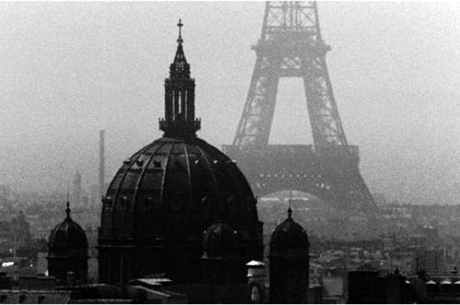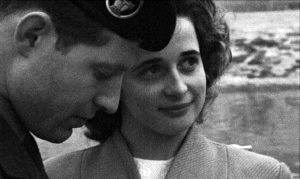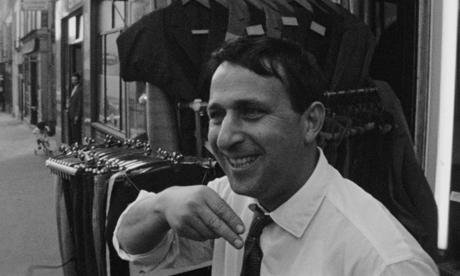Reviewed by Glenn Erickson
The first thing you should ask yourself is, do you want to spend the month of May, 1962 in Paris? Taking a cue from Jean Rouche's Chronicle of a Summer, filmmaker Chris Marker set out to use new theories of documentary filmmaking for his portrait of Parisian life at a particular point in history. Le joli mai (The Lovely Month of May) utilizes what were then new lightweight 16mm film cameras, synchronized to an audio recorder through hardwire connections. Before the experiments of American filmmakers and Frenchmen like Rouche, most documentaries had been rigidly scripted and filmed, almost like narrative dramas. The progressives desired to dispense with the interpretive stage of documentary filmmaking that imposed the author's point of view through narration, guided interviews and manipulative editing. The idea was to aim a camera at real things and people and allow them to be themselves.
The term "cinema vérité" was eventually coined to describe these kinds of movies, even though film studies classes continue to affirm that the presence of a camera usually distorts the subject being filmed. Chris Marker preferred the term "direct cinema", which doesn't make the claim that an absolute truth is being recorded. Direct Cinema also describes the method of filming. With his soundman at his side, cameraman Pierre Lhomme was essentially a one-man film unit, grabbing his shots on the fly and making most of the visual decisions. For this reason the fair-minded Chris Marker insisted upon a shared director credit.

Chris Marker, of course, is the director of some of the most intelligent documentaries ever made, as well as the conceptual sci-fi masterpiece La jetée. There is nothing tentative or fuzzy about Le joli mai, which grabs and holds our attention throughout. For Francophiles, it's an opportunity to visit a marvelous Paris of the past, one that by and large no longer exists.
Part one of the film is entitled Prayer on the Eiffel Tower. Marker kept things simple, at first asking Parisians on the street their opinions about happiness. Are they happy? An opening narration (that imposes no formal thesis) tells us that with the end of the Algerian War, France is finally at peace. Any filmmaker will affirm that a successful documentary needs to be in the right place at the right time. During the filming period of Le joli mai civil unrest hit the streets of Paris. The end of the war saw not peace but the beginning of a possible putsch against the De Gaulle government by the OAS, a right-wing military group. At one point in the show, we see news film of a Joan of Arc celebration, in which De Gaulle appears in public -- a situation familiar from the Fred Zinnemann thriller Day of the Jackal.
Marker and Lhomme encounter some discussion of this new civil conflict, but the average citizens they encounter couldn't be less concerned with affairs of state or historical events. An amusing clothier complains about having to work hard with his boss and wife both complaining. A poor mother with nine grimy children expresses her joy to be moving from a two-room slum to a larger apartment. A mechanic proudly shows off the oil paintings he creates in his spare time. A pair of errand boys at the stock exchange seem to have no ambitions beyond making enough money to have a car and go on dates. A black student from Dahomey and a young Algerian talk about the racism they've encountered in their adopted city. The Algerian was wrongfully imprisoned and beaten by the DST (Domestic Intelligence Agency) -- but neither immigrant plans to return to where they were born.
We quickly realize that these people all simply want to improve their lives a bit. Many of their wishes are consumer-oriented. A man smiles when he thinks about being able to afford a TV, and we see a family in a shantytown happily watching Earth vs. the Flying Saucers on their little B&W set. These people are not media savvy, and do not affect Telegenic personalities for the camera. One or two are a little intimidated or self-conscious, but most of the Parisians on view have strong personalities that strike us as authentic.

The most charming subjects are a pair of young marrieds just 21 years old. He's a soldier wearing the beret of a paratrooper. They seem caught up in the happiness of their relationship, which at the moment is their whole world. But Marker's gentle questions make us wonder how long this bubble will last: they aren't thinking about anything outside themselves and the future is a blur. They dismiss questions about politics. Yet the young husband is leaving in ten days, to serve in Algeria. 1
The second part of the film is entitled The Return of Fantomas, and the theme changes from 'happiness' to asking Parisians what worries them. We see men practicing at a pistol range and the funerals of Communists killed in street battles. We hear references to Francis Jeanson, a philosopher-intellectual who gathered funds to support Algerian independence. We also see a group of supporters for Raoul Salan, the founder of the OAS. Is the spirit of the pulp-fiction anarchist Fantomas rising again?
Marker and Lhomme take their camera into crowds arguing about widespread service strikes. A woman supporting the strikers is told to go to Russia, but other Parisians side with the workers. Another woman accuses the filmmakers of being "radio whores to the government." Barroom philosophers voice their interpretations of the political scene. An ex-priest explains that he left the priesthood to become a Communist activist, so he could do something real to support his fellows. The episode with the Algerian worker is followed by footage showing other Algerians doing menial work that French workers won't: 'the lowest proletariat in a colonizing country always has a sub-proletariat from the colonized country'.
But the tone of Le joli mai is not dark. Michel Legrand's music is optimistic, and often jazzy. The infrequent narration is read by Yves Montand (Simone Signoret for the English version), and Montand sings a title song for the intermission between parts one and two. The camera contrasts the city's new architecture with the beautiful, historically significant buildings of the old Paris. Along the way Marker pointedly makes room to film the cats he encounters -- Marker loves cats! We see nightclub patrons dancing enthusiastically to The Twist and learning a little line dance called The Madison -- the one Anna Karina performs in Godard's Band of Outsiders. In addition to his cats, Marker shows a woman caressing her pet Owl. The little bird seems more than happy to have his head and cheeks rubbed!

The finish is more narration-poetry read over beautiful time-lapse pictures of Paris streets and the Arc de Triomphe. The narrator contemplates the thoughts of convicts in the prisons of this great city, and asks why Parisians on the street look so worried. We feel as if we've stepped into a time machine, and now know what it might be like to be in Paris in May '62 --- besides a couple of distant landmarks, we've gone nowhere near any tourist destinations. Le joli mai may be the best of the "city portrait" films, even though it is not a "city symphony" like the Russian and German silent classics. We wish that Marker and Lhomme could have revisited these people twenty years later, to find out what became of them.
Icarus Films' DVD of Le joli mai is a beautiful transfer of this once-rare film treasure, which was shot on a combination of 35mm and 16mm film, with a few news film sources added as well. Enhanced at 1:66, all of the footage looks like 35mm. The handheld camerawork of Pierre Lhomme and his crew is phenomenally good -- there is no searching for framing or focus in the middle of shots. The polished main titles even make room for humor, with the three editors identified as "femmes à ciseaux" (scissor women"). There are also credits for "Investigators" and "Henchmen." Perhaps they're researchers and production assistants?
The disc has separate viewing paths for English and French, both of which carry French and English subtitles. Although Simone Signoret's voice is appealing, I liked hearing the original French and reading the translation.
The restored Le joli mai is 146 minutes long. We are told that Marker and Lhomme cut upwards of twenty minutes from it for the new restoration. The excision is most likely the 17 minutes of deleted scenes included on the disc.
The other extras are similar Direct Cinema shorts with an involvement by either Chris Marker or Pierre Lhomme. Catherine Varlin's 27-minute Playtime in Paris (1962) is almost a practice run for Le joli mai, a sampling that starts in a classroom and then observes various subjects from afar. A woman is compared to a cat, and then we see a little girl on a playground, kissing, hugging and swatting a little boy companion as if he were a doll-plaything. A supermarket is compared to a flea market; an upscale equestrian event is compared to a soccer match, a comic bullfight and other attractions. Marker edited and Lhomme was the cameraman.
Jean Ravel's A Distant Gaze (D'un lontain regard) is not in the IMDB. It's a 12-minute observance of people on the streets backed by Michel Legrand music. And Exercise in Direct Cinema shows Pierre Lhomme working with an adapted Eclair camera. Shot as a 'master class' project by a film school, we see Lhomme tethered to his sound recordist and boom man during filming. Lhomme wore headphones to hear monitor the sound, while keeping one eye on the viewfinder and the other open to judge action on the fly.
Icarus' welcome insert booklet contains Chris Marker's account of the filming titled Passionate Objectivity, and a couple of interviews with him and Pierre Lhomme. Sound engineer Antoine Bonfantí also provides an interview, along with input from the film's restoration experts. Most welcome is a glossary of special terms and historical references in the films -- FLN, OAS, The Harkis -- although I had to look up Francis Jeanson for myself.
Divided into its two halves, Le joli mai never seems slow -- something interesting is happening at all times. As a film student of the 1970s, it sometimes seems unfair to have had to wait forty years to see all the movies that we read about at UCLA. This is one of the important ones.
On a scale of Excellent, Good, Fair, and Poor,
Le joli mai rates:
Movie: Excellent
Video: Excellent
Sound: Excellent
Supplements: Three short Direct Cinema films, deleted scenes, insert booklet with essays, interviews, glossary of terms.
Deaf and Hearing-impaired Friendly?
YES; Subtitles: English, French
Packaging: 2 DVD discs in keep case
Reviewed: November 23, 2013
Footnote:
1. The timing this statement implies will have to be explained to me ... if the Algerian War is over, why is the young paratrooper being deployed there?
Return

DVD Savant Text © Copyright 2013 Glenn Erickson
See more exclusive reviews on the Savant Main Page.
Reviews on the Savant main site have additional credits information and are often updated and annotated with reader input and graphics.
Also, don't forget the
2011 Savant Wish List.
T'was Ever Thus.
Return to Top of Page
|

